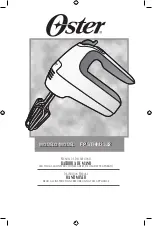
7
●
Take protective measures when dust can develop
during working that is harmful to one’s health, com-
bustible or explosive. Example: Some dusts are re-
garded as carcinogenic. Wear a dust mask and work
with dust/chip extraction when connectable.
OPERATING INSTRUCTIONS
The choice of stirrer paddle depends on the material
to be stirred. For materials with low viscosity, e. g., dis-
persion paint, varnish, adhesions, casting compound,
cement grout, etc., use a stirrer paddle with left-hand
spiral.
For materials with high viscosity, e. g., ready-mixed
plaster, concrete, cement, screed,
fi
ller, epoxy resin,
etc., use a stirrer paddle with right-hand spiral. While
mixing, move the power tool in an up and down motion.
Clean the stirror paddle after use.
MAINTENANCE
Make sure that the machine is not live when
carrying out maintenance work on the motor.
Regularly clean the machine housing with a soft cloth,
preferably after each use. Keep the ventilation slots
free from dust and dirt.If the dirt does not come off use
a soft cloth moistened with soapy water. Never use
solvents such as petrol, alcohol, ammonia water, etc.
These solvents may damage the plastic parts.
The machine requires no additional lubrication.
Should a fault occur, e.g. after wear of a part, please
contact your local SBM Group dealer.
ENVIRONMENT
In order to prevent the machine from damage during
transport, it is delivered in a sturdy packaging. Most of
the packaging materials can be recycled. Take these
materials to the appropriate recycling locations. Take
your unwanted machines to your local SBM Group
dealer. Here they will be disposed of in an environmen-
tally safe way.
c) Disconnect the plug from the power source and/or
the battery pack from the power tool before making any
adjustments, changing accessories, or storing power
tools. Such preventive safety measures reduce the risk
of starting the power tool accidentally.
d) Store idle power tools out of the reach of children
and do not allow persons unfamiliar with the power tool
or these instructions to operate the power tool. Power
tools are dangerous in the hands of untrained users.
e) Maintain power tools. Check for misalignment or
binding of moving parts, breakage of parts and any
other condition that may affect the power tool’s opera-
tion. If damaged, have the power tool repaired before
use. Many accidents are caused by poorly maintained
power tools.
f) Keep cutting tools sharp and clean. Properly main-
tained cutting tools with sharp cutting edges are less
likely to bind and are easier to control.
g) Use the power tool, accessories and tool bits etc. in
accordance with these instructions, taking into account
the working conditions and the work to be performed.
Use of the power tool for operations different from
those intended could result in a hazardous situation.
5) Service
a) Have your power tool serviced by a quali
fi
ed repair
person using only identical replacement parts. This will
ensure that the safety of the power tool is maintained.
MACHINE-SPECIFIC SAFETY WARNINGS
●
Do not use the power tool for explosive materials
(e. g., easily in
fl
ammable solvents). Power tools pro-
duce sparks which could ignite developing vapours.
●
In case the power tool should fall into the material
to be stirred, pull the plug immediately and have the
power tool checked by an after-sales service agent.
Material that has penetrated the power tool can
cause damage and lead to an electric shock.
●
Always use the auxiliary handle supplied with the
machine. Loss of control can cause personal injury.
●
When working with the machine, always hold it
fi
rm-
ly with both hands and provide for a secure stance.
The power tool is guided more secure with both
hands.
●
Do not work materials containing asbestos. Asbes-
tos is considered carcinogenic.








































